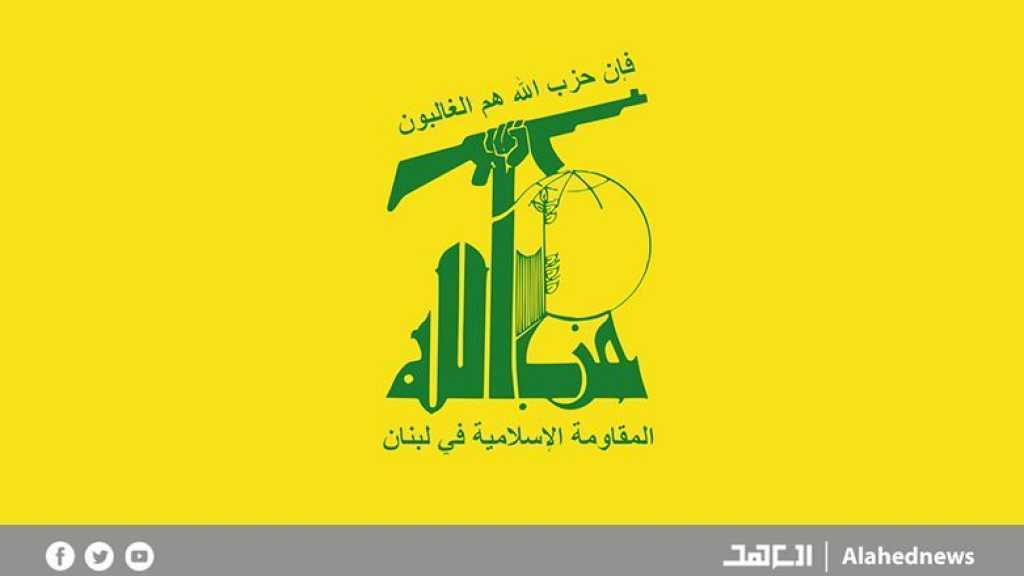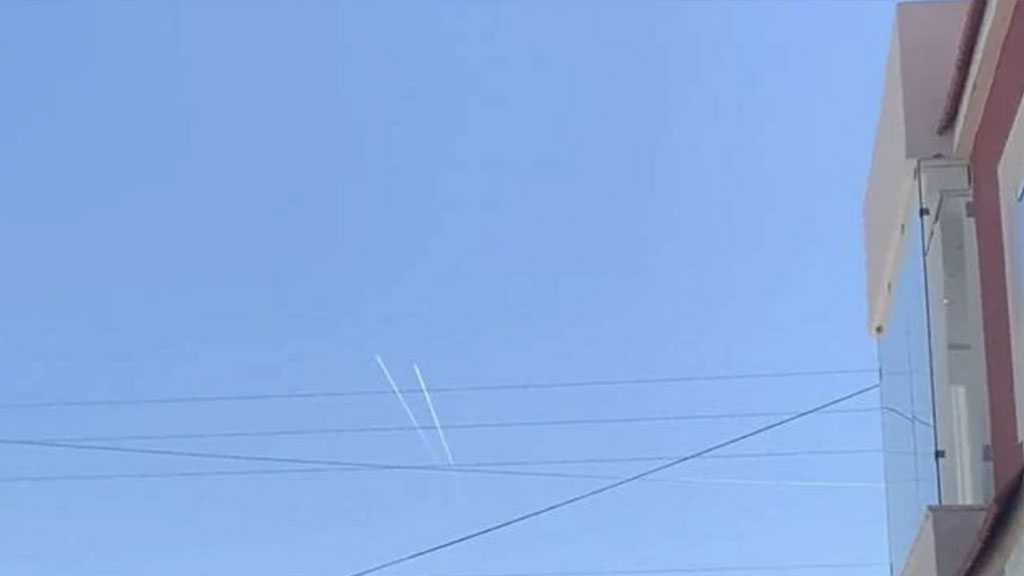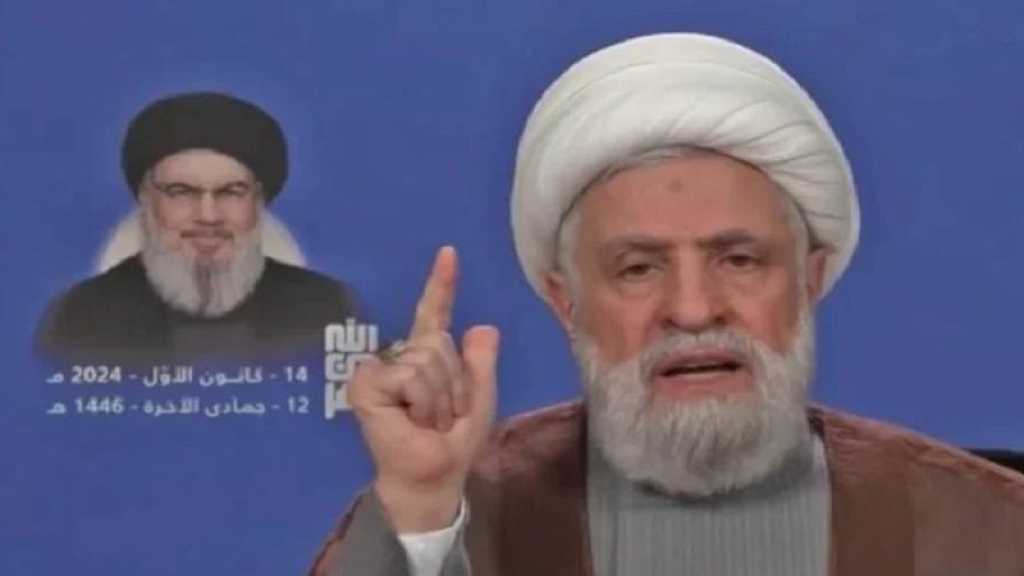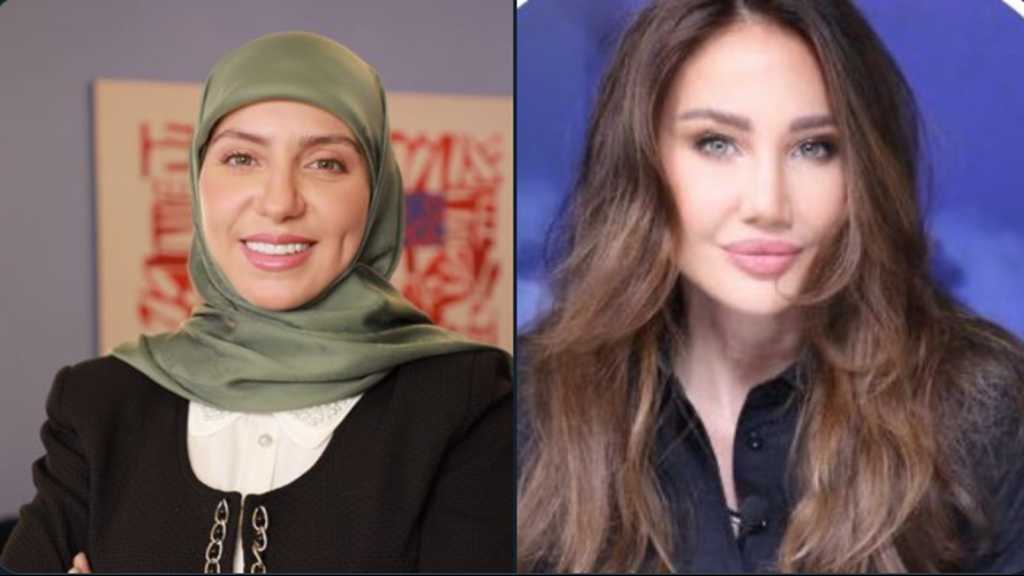
Sayyed Nasrallah: Iran Deal Wiped Polarization, No Single Nation Can Make Decisions Alone
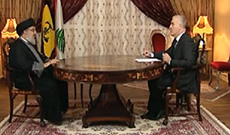
Local Editor
Hizbullah Secretary General His Eminence Sayyed Hassan Nasrallah hailed Tuesday the Iranian nuclear deal with the world powers, given its very important consequences.
In an interview with OTV, His Eminence confirmed that the first winner from this agreement is the people of the region, from the Gulf to the Middle East. "Regional and international forces were pushing for the choice of war with Iran and this is not an easy choice, and it would have led to very dangerous repercussions on the entire region."
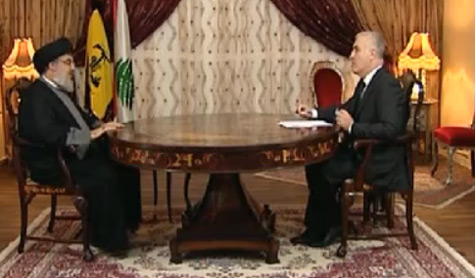
Iran Deal Achievement, Position on Palestine Ideological
"The agreement produced by Iran's dialogue with the P5+1 world powers has consolidated the multi-polar nature of the current world order and from now on, no single nation can make decisions and settle things on its own," Sayyed Nasrallah assured.
In parallel, the Resistance Leader elaborated: "The first result of the agreement was lowering the possibility of war and I cannot say that it eliminated that possibility."
"I don't believe that "Israel" can bomb nuclear facilities without an American green light," Sayyed Nasrallah added.
Moreover, he stressed that "important transformations have taken place in the region and the world and although the long course was between Iran and the international community, some parties have claimed that the deal was made with "the Great Satan"."
As His Eminence viewed that "It is early to talk about normalization between the US and Iran," he pointed out that "there are a lot of outstanding issues."
"I do not think that things are going to normalize soon, the objective of the Iranian position is to reassure the Gulf states that the understanding with Washington is not to be at its expense," he said, and reiterated that Iran took what it had wanted from the nuclear deal.
On another note, he emphasized that Iran's ideological
position on "Israel" will not change, neither will its position on the
Resistance. In the Palestinian file, Iran also will not abandon its
stance," his eminence assured.
US Foreign Policy Failing
Sayyed Nasrallah further mentioned that the Americans are in front of a bitter reality:" : The wars they fought in Iraq have failed, in Afghanistan they reached a dead end and the wars on Lebanon and Gaza foiled the New Middle East scheme, and now they have failed in Syria."
"Despite the economic sanctions, non was able to topple the Iranian regime...Days ago, US chief of staff said that the capabilities of the US army are at their weakest levels since decades, this means that the Americans are facing a new situation and they don't want war and Iran has not fallen."
On the same level, Sayyed Nasrallah noted that US Secretary of State John "Kerry was clear when he said that his country is tired of war and does not want a new war and a temporary agreement happened with Iran."
He also revealed that the Americans wanted to discuss other issues with Iran, and throughout history, the US always tried to discuss all issues as one package but the Iranians have always preferred to discuss one dossier at a time.
Based on his information, the Iranians are the ones who insisted on postponing talks with the Americans on any other point other than the nuclear issue.
Sayyed Nasrallah, regarding the Iranian Foreign Minister Mohammad Javad Zarif's last visit to the Gulf states, said that Iran hasn't cut relations with neighbor countries ever, but the problem lies with the other party, noting that the Iranian FM wants to reassure the Saudis that nothing has been agreed upon against their interests.
"Minister Mohammad Javid Zarif is reassuring them today
that nothing will happen at the expense of the Gulf countries and he was
keen on reassuring Saudi Arabia," he confirmed, giving the example of
"Saudi Arabia's war on the Muslim Brotherhood in Egypt."
Saudi Arabia Enmity with Iran
On another regional file, Hizbullah leader emphasized that "the Gulf countries, particularly Saudi Arabia, always treats Iran as an enemy, but the Islamic Republic has always been ready to engage in dialogue."
"The Saudis have proxy wars with Iran inside Iran, Iraq, Syria, Lebanon, and Pakistan," he viewed, and stated "the KSA's problem with Iran is not sectarian but rather political, related to the leadership of the Arab and Islamic worlds."
In parallel, Sayyed Nasrallah stressed that "Riyadh, which does not accept partnership, doesn't dare to wage a direct war but spends tremendous amounts of money for that."
His eminence further added that since the beginning, the Saudi Arabia dealt with Iran as an enemy and Saddam Hussein's war on Iran was financed by the Saudis. Iraqi and Iranian peoples paid for that war as well as the Palestinian people and the Kuwaitis.
"Saudi war on Iran hasn't stopped since 1979. The Saudi party doesn't dare to launch direct war with anyone, but fights through proxies and pays for them in Syria, Iran, Iraq and Lebanon," he said, assuring that "The Saudi Arabia does not accept any partner. It wants to make all Arab countries subordinate to it."
Hizbullah -Qatari Relations
In response to a question on receiving a Qatari delegation, His Eminence revealed that he indeed had received a Qatari delegation in the past few days.
According to the Hizbullah SG "Qatar is re-evaluating all its stances in the region and we were concerned with the issue of the Aazaz abductees and the Qatari contribution reopened the doors of dialogue between us."
"We're still in a disagreement with Qatar over Syria but we were not seeking problems with anyone, even with Saudi Arabia," he said, and noted that "Contact between Hizbullah and Turkey has never ceased."
Describing the new Hizbullah-Qatari relation, Sayyed Nasrallah said the Resistance movement expressed that military option in Syria is not useful, and toppling the current situation is also useless, calling all states that affect events in Syria to work for a political solution.
He stressed that "This is how we started to talk with Qatar, then we moved on to disassociating Lebanon from problems."
Hizbullah-Turkish Relations
Concerning relations with Turkey, Sayyed Nasrallah
assured "Our contacts with Turkey were not cut. Meetings with the
Turkish ambassador to Lebanon were also held. Nothing new with our
relations with Turks."
Moreover, His Eminence stated "The Turks have lost a great deal. There is tension now between it and Syria, Iran, Egypt... and that has impacted it internally,"' adding "there has been a clear Turkish attempt to rearrange relations with Hezbollah because Turks think they have lost so much regarding their relations with Lebanon, President Bashar al-Assad and Iran, which were excellent before the Syrian crisis erupted."
Hizbullah in Syria
Moving to tackle the Syrian crisis, His Eminence warned that it is threatening our nation, Lebanon."
Sayyed Nasrallah pointed out that Hizbullah did not interfere in Syria until the so-called revolution was hijacked, and had called for political solution all the way from the beginning.
"From the very beginning, we contacted President Bashar al-Assad who assured he is willing to make reforms," Sayyed Nasrallah noted, further elaborating that "the major problem was in the answer of the other camp, including France, Britain, Saudi Arabia, Qatar and others who rejected any reform and had only one answer which was military solution and toppling the Assad regime."
The Resistance leader also clarified that Hizbullah did not interfere in Syria until recently. "We did not interfere immediately in Syria, we did so in the villages at the Lebanese borders, but when the war developed and the Syrian army withdrew, the Lebanese residents of these regions resorted to us seeking help; they had two choices, either to flee or stay under the mercy of the terrorist rebels.
Assuring that the residents of these villages were the ones to fight the battle with the guidance of few Hizbullah cadres, Sayyed Nasrallah assured that "Had it not been for Hizbullah's help to the people of al-Qusayr's countryside, the armed groups would have invaded all these towns."
Meanwhile the Lebanese government did not care for the Lebanese citizens there and kept the borders open for smuggling weapons to al-Qusayr from North and West Lebanon, Sayyed recalled iterating "We went to al-Qusayr in a pre-emptive operation. If we didn't take the initiative, armed groups would storm the Lebanese border towns."
He went on to say "Our presence in Syria is limited in Damascus, Homs and the surrounding areas of Lebanon. We are located in al-Qussayr and Damascus.The Syrian army is carrying out the today's operations in Qalamoun along with the national defense forces."
Moving on to the Sayyeda Zeinab (pbuh) shrine, His Eminence assured that Hizbullah was obliged to interfere in defense of religious sanctities and also in defense of Lebanon, noting "We only sent 40 to 50 men to help defend the shrine."
Sayyed Nasrallah, mentioning the martyrs, hailed their families and assured that Hizbullah is proud they belong to the resistance movement.
More on the topic, he said "If we abandon our responsibilities, the Lebanese-Syrian border would be invaded and I give you the example of the booby-trapped cars that are coming from the Syrian cities of Yabrud and Nabak," reminding that three booby-trapped cars were unveiled in Nabak and were supposed to be sent to Lebanon.
He also shed light on the vicious attitude of the groups fighting in Syria, how the ISIL and Nusra Front are executing so-called Free Syrian army commanders and even chopping off their heads, asking if such is a demonstration to the values of a revolution.
As for the level of Hizbullah military intervention, Sayyed Nasrallah clarified that "There are major exaggerations;" adding "we say that those fighting with the regime are mainly the army and the National Defense committees."
Assuring that there is no single captive for Hizbullah in Syria, Sayyed Nasallah accentuated that the number of martyrs has not reached 200 like some sides claim.
His eminence elaborated "if we abandoned our duty in al-Qussayr and Qalamoun, tens and hundreds of booby-trapped cars would enter into Lebanon, and we had gone to Syria in order to avoid this," pointing out that "the car which had exploded in Lebanon had came from Yabrood through Arsal," wondering "what the future of Lebanon will be if Syria falls by armed groups?"
Sayyed Nasrallah stressed that "the level of support in
the Lebanese people to the Hizbullah intervention in Syria is higher
than the rate of support for resistance movements from 1982 to 1990."
He assured that Iran has no relation to the Hizbullah
decision to take action concerning Syria, stressing that they only
informed the Iranians of the decision.
"Iran does not interfere in our domestic affairs. It does not order us to participate in the cabinet. What Iran wants in Lebanon is that people understand each other and Lebanon wouldn't be dragged into war."
Sayyed Nasrallah added "if the March 14 bloc relation with Saudi Arabia was like the Hizbullah relation with Iran, Lebanon would be problem-free."
Lebanese Arena
According to Sayyed Nasrallah, Hizbullah was the first to condemn the bombings of Tripoli. He stated that on that day he was you gloomier than the days of Ruwais and Bir al-Abed blasts, because it was clear that someone aims at dragging the country into sedition."
Commenting on the security situation in the northern Lebanese city of Tripoli, Sayyed Nasrallah said "what was reported about Mufti of Tripoli and the North Sheikh Malek al-Shaa'r on the relationship between the gunmen with the security services is true", underlining "we know that the Internal Security Forces Directorate General, and over the years, is paying money to armed groups and moving ammunition by ISF cars during the last few years."
Highlighting the solution, he noted "the state must hold the security situation in Tripoli and form a crisis cell. Tripoli and the North need dialogue and all the parties must meet."
Sayyed Nasrallah assured that political choices of the March 8 bloc are gains, while the March 14 due to their political choices are losing. "We do not have a larger project for Lebanon, but we support a real partnership in Lebanon and with the participation of everyone."
Source: Al-Ahed News
Comments
